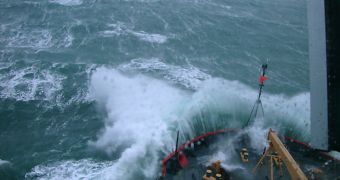A new analysis carried out in the frigid waters off the coasts of Alaska has revealed that life does not simply grind to a halt during the winter months. Previously, it was thought that the darkness and merciless cold were driving species away from this area for extended periods of time.
Experts recently conducted a research cruise in these regions, and investigated the number of microorganisms that remain active throughout the winter months. At first, they were expecting to find many of the lifeforms dormant.
What they instead discovered was that the organisms were pretty much as active as ever. This is very important because the microorganisms the team focused its research on are the very foundation of marine food webs.
Using funds provided by the US National Science Foundation (NSF), a collaboration of scientists used the US Coast Guard's (USCG) icebreaker Healy to conduct the six-week expedition. Conditions were rough aboard the ship, with winds sometimes reaching speeds of up to 70 knots.
The investigation was primarily focused on collecting samples from specific areas in the Bering, Chukchi and Beaufort seas. Now that scientists are safely back in their labs, they are beginning to put together a bizarre image of how life survives in the Arctic during the prolonged winter.
One of the most remarkable discoveries was that zooplankton is active during the cold months. These microscopic organisms range in size from small protozoans to large metazoans. Jellyfish are the largest forms of zooplankton.
“The zooplankton community seemed to be quite active. They were feeding at low rates. That was a surprise,” explains Woods Hole Oceanographic Institution (WHOI) investigator Carin Ashjian, who was also the chief scientist of the expedition.
Preliminary details of the investigation will be discussed this week, at the 2012 Ocean Sciences Meeting, which is organized by the American Geophysical Union in Salt Lake City, Utah. Full details of the study will take a lot more time to compile, the team says.
This research has great potential towards explaining how global warming and climate change are affecting Arctic food webs. The ecological balance of Arctic seas is very difficult to study, primarily because of the harsh conditions scientific expeditions are subjected to.
“This kind of research is really improving our fundamental understanding of this very important part of the ocean and giving us new information that we can put to use both in numerical models that are used to investigate ecosystem responses to environmental changes, but also in scientists' conceptual models of how these ecosystems really function,” Ashjian concludes.

 14 DAY TRIAL //
14 DAY TRIAL //